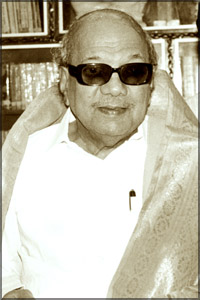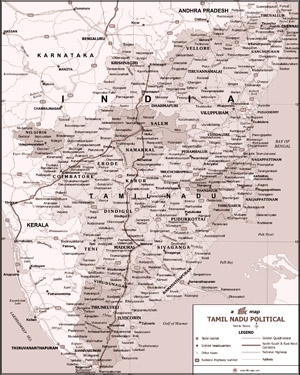Will Tamil Nadu factor influence politics in the south?
Wanni military operation:
By Indeewara THILAKARATHNE
[email protected]
With the Sri Lankan army gaining an upper hand in the theatre of war
in the North and East, once again Sri Lankan political landscape is
braving a gathering political storm in Tamil Nadu in the southern tip of
India.
|

Tamil Nadu Chief Minister M.Karunanidi |
Almost the kneejerk reaction on the part of the pro-LTTE political
parties in Tamil Nadu led by Dravida Munnetra Kazhagam (DMK) comes at a
time when the army is at the threshold of the LTTE held Kilinochchi and
the LTTE leadership is virtually trapped in the area.
It is clear that the purpose of the All-party parlay convened by
Tamil Nadu Chief Minister M. Karunanidi was to halt the on-going
military offensive against the LTTE in Wanni, though the declared
objective of the meeting was to salvage the entrapped civilians in
Kilinochchi and Mullaitivu districts and to express solidarity with the
Tamils of Sri Lanka.
However, the chief opposition AIADMK with its ally MDMK, BJP
boycotted the Tuesday’s all party meeting in Chennai, calling it an
“Eye-wash”. For the first time Tamil Nadu government has used the term
“Ealam” in an official statement.
This (all party) meeting informs centre that if India does not
fulfill the demands, (the inaction) may result in the resignation of all
MPs from Tamil Nadu” a resolution adapted at the meeting states.
Following the all party meeting, in a further step to exert pressure on
the centre, the daughter of Tamil Nadu Chief Minster Karnanidhi,
Kanimozhi handed over post-dated resignation to the party chief.
Tamil chauvinism
Fanning the Tamil chauvinism in Tamil Nadu as a last ditch attempt to
salvage LTTE from the inevitable defeat at the hand of the Sri Lankan
army has been a political strategy adapted by LTTE throughout its
struggle to carve out a separate state in Sri Lanka.
However, the Indian intervention in the issue turned out to be a
costly diplomatic initiative when the Indian Peace Keeping Force (IPKF),
which arrived in Sri Lankan in 1987 under the Indo-Sri Lanka Peace
Accord, had to launch operation codenamed “Operation Pawan” to capture
Jaffna peninsula from LTTE. India not only lost thousands of its
soldiers at the hands of the LTTE but also a national leader. The post-IPKF
era was marked by the assassination of former Indian Prime Minister
Rajiv Gandhi in 1991 while he was on election campaign in Sri Perumadur
in Tamil Nadu and subsequent assassination of President Ranasinghe
Premadasa in 1993 in Colombo. Since 1991 successive Indian Governments
had taken a policy decision to stay out of Sri Lanka’s internal affairs.
Although India has expressed concern over the political situation in
Sri Lanka and the plight of the Tamils trapped in Wanni, it has not
changed its stance on Sri Lanka and continues to uphold the policy of
non-interfering into the internal affairs of Sri Lanka.
Apparently in reaction to political developments in the state of
Tamil Nadu, Indian Prime Minister Manmohan Singh stated that ‘We always
believe that the situation in Sri Lanka did not call for military
victory. It calls for a negotiated political settlement which respects
the unity and integrity of Sri Lanka and, at the same time respects the
essential human rights of minorities, particularly the Tamil minority”.
However, the Congress party spokesman Abhishek Singvi admitted Indian
Government’s limitations on the issue of Sri Lankan army offensives in
the north and the East of Sri Lanka. He categorically stated that
central government could not exercise its authority beyond its
territory.
“Those who make demands about other sovereign countries should know
that India’s sovereignty ends at the boundaries of India” stated
Abhishek in response to the demand made by Tamil Nadu politicians for
the immediate stoppage of military offensives in Sri Lanka and
resumption of talks with LTTE. In addition, the Congress party spokesman
also stated that foreign relation issues are the exclusive domain of the
centre. “The parties should also understand that you are not dealing
with a part of India but a sovereign nation” he further stated.
The Hindu, leading Indian national in an editorial, expressed grave
concerns over the danger posed by rising Tamil chauvinism in Tamil Nadu.
Inter alia, it pointed out the fact that Tamil Nadu politicians are
maintaining a double standard on the fight against terrorism. The
editorial stressed that the Tamil Nadu politicians seem to accept the
India’s war on terrorism and saving Kashmir from Islamist Jihad as
important national tasks and not saving Sri Lanka from the LTTE’s
terrorism.
In the strongly warded editorial, Malani Parthasarathy stated that
LTTE pioneered terrorism in South Asia and sabotaged every attempt to
find a political solution to the conflict. If the politicians in Tamil
Nadu are really concerned over the plight of the Tamils trapped in Wanni
and wanted to express their solidarity with them, they should have
exerted pressure on LTTE to give up arms and come into the mainstream
politics. This is an option still available to LTTE since President
Mahinda Rajapaksa has reiterated his invitation for LTTE to renounce
violence and to enter democratic politics, a fact which has been
conveniently forgotten by politicians in Tamil Nadu.
Changing geo-political realities
The influence of Tamil Nadu factor in shaping the course of politics
in Sri Lanka should be assessed against the backdrop of changing
geo-political realities. Since the September 11 attacks on the twin
towers and America’s declaration of war on terrorism, sovereign nations
have understood the dangers posed by terrorism. Firm decisions have been
taken in the sphere of foreign policy to curb the terrorist activities
and not to allow secessionist and extremist groups to use one country as
a launching pad against another. Since LTTE was listed as a banned
terrorist outfit in 32 countries including USA and India and LTTE leader
Velupillai Prabhakaran and intelligent chief Pottu Amman were sentenced
to death by a court of law which heard Rajiv Gandhi assassination case,
it is highly unlikely that India would interfere into Sri Lanka’s
internal affairs. Therefore, it could be concluded that influence of
Tamil Nadu factor is waning. Besides, the Government of Sri Lanka is
also of the view that the final solution to the issue is a political
solution. Government has ensured supply of essential food into Wanni
even under trying circumstances.
Political package in the offing
Government has come out with a substantial package of devolution
despite notable absentees of some political parties. The chairman of the
APRC, Minister of Science and Technology Prof. Tissa Vitharana stated
that Government is ready with a political package to be implemented
under a new Constitution as soon as the present offensive in Wanni
concludes. He further stated that a consensus has been evolved on
devolution of power to the centre and nine provinces and a second
chamber, an upper house will be set up, comprising eight representatives
each from the province. This provision has been included in order to
ensure that no legislation to take away devolved power be enacted. If
such piece of legislature be enacted, it should be done at a joint
parliamentary session. Another feature of the political package is the
removal of the concurrent list. Prof. Tissa Vitharana stated
that Government is ready with a political package to be implemented
under a new Constitution as soon as the present offensive in Wanni
concludes. He further stated that a consensus has been evolved on
devolution of power to the centre and nine provinces and a second
chamber, an upper house will be set up, comprising eight representatives
each from the province. This provision has been included in order to
ensure that no legislation to take away devolved power be enacted. If
such piece of legislature be enacted, it should be done at a joint
parliamentary session. Another feature of the political package is the
removal of the concurrent list.
Opposition’s role
Opposition’s role at this crucial juncture is vital on many counts.
However the main opposition party maintains a silence over the
developments in Tamil Nadu. Instead of strengthening President
Rajapaksa’s hand, the UNP seems to be engaged in a covert operation
through its political envoy Dr. Jayalath Jayewardene who apparently on a
global tour covering many destinations including Rome and Geneva to
muster support from the international community to exert pressure on Sri
Lankan Government to halt the on-going military operation in Wanni.
This is marked contrast to the position taken by the then opposition
led by SLFP when the then UNP Government of President Ranasinghe
Premadasa requested India for the immediate pull out of IPKF. Despite
personal links with Gandhi family Madam Srima R. D. Bandaranaike
extended unconditional support for the UNP Government.
It should be mentioned here that Madam Bandaranaike supported the
Government notwithstanding the fact that her civil right had also been
deprived by UNP regime. The role of the opposition at this juncture is
to extend unconditional support for the Government for the common good
instead of trying to achieve parochial political objectives at the
expense of the masses.
|
